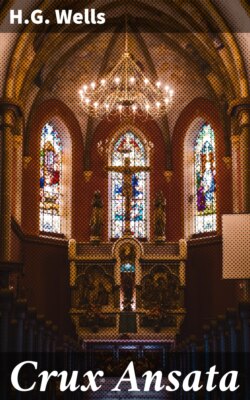Читать книгу Crux Ansata - H.G. Wells - Страница 11
На сайте Литреса книга снята с продажи.
VIII. — BLACK INTERLUDE
ОглавлениеTable of Contents
FOR a very long time the hold of the Emperors and the Popes upon the City of Rome was a very insecure one. Many of the surviving patrician families and also the Roman mob claimed the most conflicting privileges in the election and removal of the Popes, the German Emperor claimed similar rights, and on the other hand the popes would assert their rights to depose and excommunicate emperors. In this confusion popes multiplied, even a layman, John XIX, was made pope, and there were overlapping popes inconsiderable abundance. In 1045 there were three popes struggling in Rome, the notoriously vicious Benedict IX, Sylvester III and Gregory VI. Gregory VI bought the Papacy from Benedict, who subsequently went back on his bargain.
Hildebrand became Pope Gregory VII. He succeeded Pope Alexander, who, under his inspiration, had been attempting to reform and consolidate the Church organisation. He imposed celibacy on the clergy and so cut them off from family and social ties. It consolidated the Church but it dehumanised the Church. Hildebrand fought a long fight with the Emperor Henry IV. Henry deposed him and Gregory deposed and excommunicated the Emperor, who repented and did penance at Canossa. Afterwards Henry regretted his humiliation and created an Anti-Pope, Clement III. He besieged Gregory who held out in the Castle of St. Angelo. Robert Guiscard, a Norman freebooter, whom Pope Nicholas n had made "Duke of Apulia and Calabria and future Lord of Sicily by the Grace of God and St. Peter", came to the rescue, drove out the Emperor and Anti-Pope and incidentally sacked Rome. After which Gregory went off under the protection of the Normans and died at Salerno, a hated and unhappy man, a good and great-spirited man defeated by the uncontrollable complexities of life.
So the story of schisms and conflicts runs on through the records of the Church. Many of the popes fought for power for the vilest ends, but we do such men as Gregory VII and Urban II (the Pope of the First Crusade) the grossest injustice if we ignore the fact that behind this barbaric struggle for power there could be long views and disinterested aims. Conformity to the concepts of Christendom or a merely brutal life impulse were the alternative guides between which men had to choose in the atmosphere of that period. Men "sinned" violently and defiantly and yet were superstitiously afraid.Death-beds generally reeked with penitence, abject confessions and pious bequests. It is difficult for a modern mind to imagine how much in that age of confusion men could believe, and how little dignity, coherence and criticism there was in their beliefs.
How far things could go with the weak, the vicious and the insolent is shown by one phase in the history of Rome at this time, an almost indescribable phase. The decay of the Empire of Charlemagne had left the Pope unsupported, he was threatened by Byzantium and by the Saracens (who had taken Sicily), and face to face with the unruly nobles of Rome. Among the most powerful of these nobles were two women. Theodora and Marozia, mother and daughter,[1] who in succession held that same Castle of St. Angelo, which Theophylact, the patrician husband of Theodora, had seized together with most of the temporal power of the Pope. These two women were as bold, unscrupulous and dissolute as any male prince of the time could have been, and they are abused by masculine historians as though they were ten times worse. Marozia seized and imprisoned Pope John X (928), who speedily died under her hands. Her mother, Theodora, had been his mistress. Marozia subsequently made her illegitimate son Pope, under the title of John XI.
[1] Gibbon mentions a second Theodora, the sister of Marozia.
After him her grandson, John XII, filled the chair of St. Peter. Gibbon's account of the manners and morals of John XII is suffused with blushes and takes refuge at last beneath a veil of Latin footnotes. This Pope, John XII, was finally degraded by the German Emperor Otto, scion of a new dynasty that had ousted the Carlovingians, who came over the Alps and down into Italy to be crowned in 962. Harsh critics of the Church call this phase in its history the pornocracy.
That "pornocracy" sounds much more awful for the Catholic Church than was the reality. It has very little controversial weight if our criticism is to be just. It was a purely Roman scandal, and the Faithful throughout Christendom probably never heard a word about this "pornocratic" phase. They went about their simple religious duties as they had been taught. It was not an age of easy travel, and practically nobody in the tenth century went to Rome or heard what was happening there. That sort of stress was to come later.
